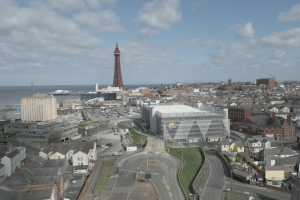Better road and rail links key to unlocking ‘massive potential’ for growth in North

Better connected airports and ports in the North of England could release massive potential benefits for trade and business growth, a report from an independent commission of business leaders has found.
Improving international links from the North could see 75 million air passengers travelling to and from the region each year by 2050, nearly double the current number.
Improved road and rail links could also see more freight being shipped directly into and out of the region, boosting the economy and easing pressure on south coast ports.
The Independent International Connectivity Commission believes that offering new international destinations will encourage business travellers and potential investors to fly to and from the North and will make the region a more attractive destination for international tourists.
John Cridland, chair of Transport for the North and former director-general of the CBI, who led the commission said, “It’s clear that the North’s ports and airports are key economic assets for the region, with nearly 40 million passengers flying from the region each year and around a third of all UK freight using northern ports.
“Yet we know that the lack of access to and from our ports and airports is holding them back, with congestion on our roads and railways making it difficult for people and goods to reach international gateways.
“These inadequate ground transport links, coupled with not enough direct services to key international destinations, mean that passengers from the North often have to travel from Southern gateways. They also act as a disincentive from both business and leisure travellers to visit the region.
“Unlike in the South, where ports and airports are heavily congested, the North’s international gateways have unused capacity.
“We believe international connectivity starts on the ground; by properly utilising available resources we can both boost the economy of the North and ease pressure on overloaded ports and airports elsewhere. We need to start promoting the North as a destination of choice, both to do business and to visit.”
The Independent International Connectivity Commission was brought together by Cridland, and consisted of Chris Davis (chief operating officer at PZ Cussons), Mark Parsons (chief customer officer UK & Ireland, DHL Supply Chain), Andrew Sentance (senior economic adviser at PWC) and Sarah Stewart (chief executive, NewcastleGateshead Initiative).
Ken O’Toole, chief executive of Manchester Airport, said: “We welcome this independent report, which makes clear the North needs strong access to the world’s most important markets in order to achieve transformational levels of growth.
“It rightly recognises the strength of Manchester Airport’s existing route network and its potential to play an even greater role in driving levels of trade, tourism and inward investment by connecting to the North to more key global destinations in the years to come.”
Former Chancellor and Tatton MP George Osborne who chairs the Northern Powerhouse Partnership (NPP), said: “I created Transport for the North in 2015 because it was clear to me the role that transport connectivity would play in delivering a northern powerhouse.
“Much has been said about the importance of connecting together the great cities of the north but today’s report demonstrates how vital it is that the region also has strong links to the world.
“In the years to come, the great airports and ports of the North will play an increasingly important role in driving greater levels of investment, trade and tourism into the UK and every effort must be made to ensure that they continue to grow and it is as easy as possible for passengers to access these key national assets.
“Since the Northern Powerhouse Partnership was created last autumn, I have spoken to hundreds of businesses, civic leaders and other organisations across the North and their feedback has been uncompromising – transport connectivity will always be the lifeblood of the region’s economy.”







